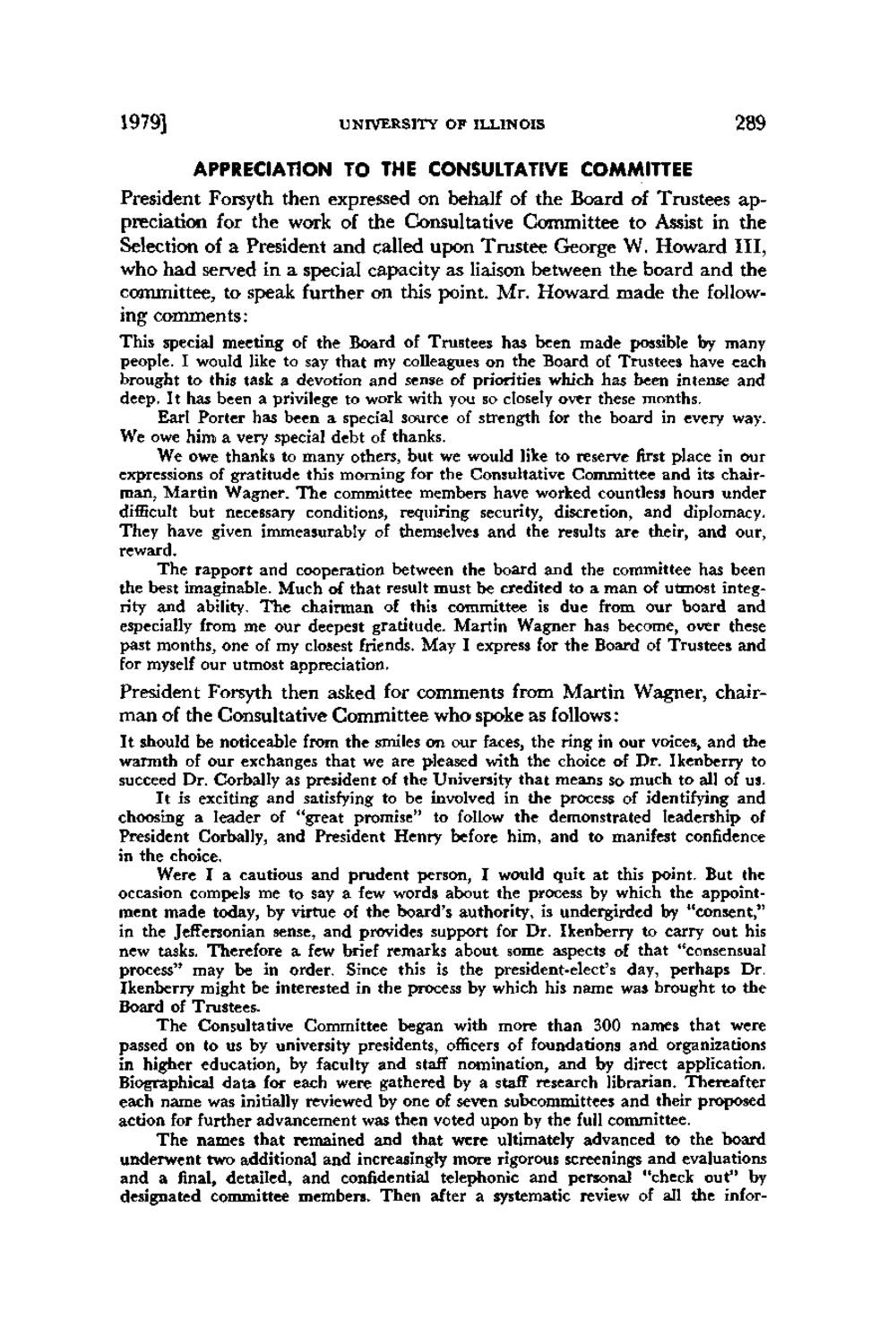| |
| |
Caption: Board of Trustees Minutes - 1980
This is a reduced-resolution page image for fast online browsing.

EXTRACTED TEXT FROM PAGE:
1979] UNIVERSITY OF ILLINOIS 289 APPRECIATION TO THE CONSULTATIVE COMMITTEE President Forsyth then expressed on behalf of the Board of Trustees appreciation for the work of the Consultative Committee to Assist in the Selection of a President and called upon Trustee George W. Howard I I I , who had served in a special capacity as liaison between the board and the committee, to speak further on this point. Mr. Howard made the following comments: This special meeting of the Board of Trustees has been made possible by many people. I would like to say that my colleagues on the Board of Trustees have each brought to this task a devotion and sense of priorities which has been intense and deep. It has been a privilege to work with you so closely over these months. Earl Porter has been a special source of strength for the board in every way. We owe him a very special debt of thanks. We owe thanks to many others, but we would like to reserve first place in our expressions of gratitude this morning for the Consultative Committee and its chairman, Martin Wagner. T h e committee members have worked countless hours under difficult but necessary conditions, requiring security, discretion, and diplomacy. They have given immeasurably of themselves and the results are their, and our, reward. The rapport and cooperation between the board and the committee has been the best imaginable. Much of that result must be credited to a man of utmost integrity and ability. The chairman of this committee is due from our board and especially from me our deepest gratitude. Martin Wagner has become, over these past months, one of my closest friends. May I express for the Board of Trustees and for myself our utmost appreciation. P r e s i d e n t F o r s y t h t h e n a s k e d for c o m m e n t s f r o m M a r t i n W a g n e r , c h a i r m a n of t h e C o n s u l t a t i v e C o m m i t t e e w h o s p o k e as follows: It should be noticeable from the smiles on our faces, the ring in our voices, and the warmth of our exchanges that we are pleased with the choice of Dr. Ikenberry to succeed Dr. Corbally as president of the University that means so much to all of us. It is exciting and satisfying to be involved in the process of identifying and choosing a leader of "great promise" to follow the demonstrated leadership of President Corbally, and President Henry before him, and to manifest confidence in the choice. Were I a cautious and prudent person, I would quit at this point. But the occasion compels me to say a few words about the process by which the appointment made today, by virtue of the board's authority, is undergirded by "consent," in the Jeffersonian sense, and provides support for Dr. Ikenberry to carry out his new tasks. Therefore a few brief remarks about some aspects of that "consensual process" may be in order. Since this is the president-elect's day, perhaps Dr. Ikenberry might be interested in the process by which his name was brought to the Board of Trustees. The Consultative Committee began with more than 300 names that were passed on to us by university presidents, officers of foundations and organizations in higher education, by faculty and staff nomination, and by direct application. Biographical data for each were gathered by a staff research librarian. Thereafter each name was initially reviewed by one of seven subcommittees and their proposed action for further advancement was then voted upon by the full committee. T h e names that remained and that were ultimately advanced to the board underwent two additional and increasingly more rigorous screenings and evaluations and a final, detailed, and confidential telephonic and personal "check out" by designated committee members. Then after a systematic review of all the infor-
| |